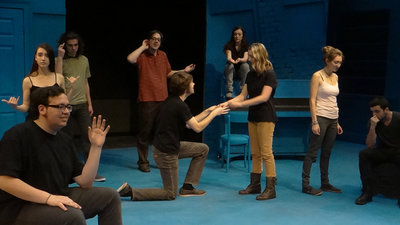
Caryl Churchill’s new play Love and Information is simultaneously the worst and the best first-date idea ever. In the intimate horseshoe shape of UO’s Hope Theatre, the play’s litany of 57 scenes and 100-plus characters was so relentless that it never occurred to me to shift so that my date could grab my hand.
Not that the play would have put me in the mood to make moves anyway. A swirling, whimsical, breathless catalogue of human relationships in varying stages of intimacy, Love and Information verged perilously near the realm of too much information. For more than two hours, the 16-actor ensemble cast navigated a palette of blue furniture, oscillating manically between scenes of tension and tautness — for example, a heated argument over whether to open the door for an insistent knocker — and images of baffled tenderness.
“We were really happy,” says one character to his former lover. “Or sad,” she replies. “We used to cry.” “Did we?” he wonders. “Sometimes,” she says.
The dialogue is obsessed with remembering, with knowing, while at the same time desiring deeply to forget. “There was someone called Hippasus in Greek times,” another character rattles, walking briskly, “who found out about the diagonal of a square and they drowned him because no one wanted to know about things like that.”
One scene consists solely of a woman sneezing. Another reveals a young boy looking at a snail.
Equal parts comedy and heartbreak, Churchill’s pithy, postmodern script is structured in verse instead of prose, lending each snapshot a representative grace not unlike poetry. The University Theatre’s treatment of the work was in beautiful alignment with this; it comes as no surprise that director John Schmor cites Churchill as one of his “favorite living playwrights.” Each scene is visibly, lovingly explored.
Though Love and Information is so character-dense that individual parts among the cast weren’t listed in the program, every conversation portrayed felt as though it occurred between two distinctly human, complex people. The subtlety of character was exceptional — not just “exceptional for college theater” — and the dozens of transitions were effortless, like breathing.
The whole play, in fact, felt quite natural. Though the dialogue can be heady and abstract, University Theatre proved itself more than capable of bringing to life characters who, in their ultimate confusion and struggle to love one another, are all too familiar. Take a date and find out how.
University Theatre’s Love and Information plays through February at Hope Theatre; $14-$16.